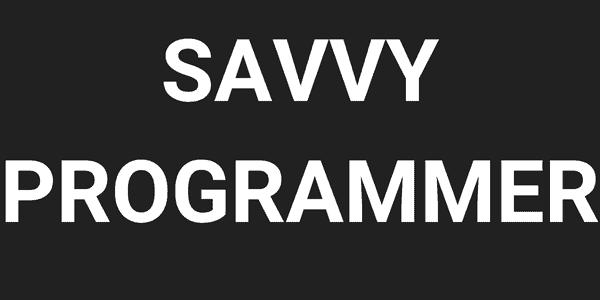In the past, a college degree was used as the only criteria for getting a job in most reputable companies. Presently, intelligent companies employ non-degree holders. They believe that leading employees can be self-taught, creating new opportunities for people planning to gain access to the workforce.
However, you need to appreciate the internet; unlike the former generations, they have the chance for self-learning with or instead of formal education. Do you want to ask why you should spend a huge amount of money on university fees when you can easily learn for free? You need total motivation and thorough discipline to create your learning strategy. Otherwise, you will offer some cash to get it.
Many who have it in mind to start their programming career don’t deem it fit to get a formal education, and they believe that they will be their own boss. In the same way, those who plan to seek employment in companies feel the need to have at least a diploma or certificate.
Related Posts: 25 Examples of SMART Goals for Programmers
Thus, you could be the kind of individual thinking of getting a degree in computer science, or probably you prefer to be a self-taught guru. In any case, no preferred choice of approach to learning, i.e, there is no right or wrong method.
All that matters is to determine which method is best for you. Hence, this article is meant to give you the pros and cons of both sides so that you can determine the path you think will be of help to you.
What is Self Taught?
Self-taught, otherwise referred to as self-education, is when you rely on yourself rather than on a formal learning condition. Or you employ the services of teachers or professors to acquire knowledge or learn new concepts or develop skills. Self-taught will help you take charge of your learning to pursue in-depth knowledge.
The Path Taken to Become a Self Taught Guru (taking web design as a case study)
The path taken by a self-taught guru is narrow. If you want to travel via this Path, it will interest you to prepare at your own learning pace. One of the best ways to understand web design is to read articles on web design and development blogs on google.
Thus, don’t be fret if you lack formal education in web design. Once you already know web design, you can still seek a job. Many smaller design firms will still employ an individual even though you lack formal education.
Although, you will receive a lesser wage compared to those with a certificate which is understandable. But, it’s a great privilege to acquire more skills from your colleagues. The experience and lessons you will gain from them are the same or more than what you would achieve if you had paid thousands of dollars in the university.
What Are The Benefits of Being a Self Taught?
Through self-education, you can have your own learning outside the classroom. Unlike what formal education provides, self-education gives a more flexible approach. Besides, it also comes with several benefits. Some of the advantages of self-taught include;
1. You are in control of what you do or learn
One major advantage of self-teaching is that you are in control of your actions. You have dominion over everything you do or learn. Besides, when you are in control, it’s easier for you to invest more in it. So, it allows flexibility and encourages you to learn at your pace. Besides, it saves you from the hassle of “one cap fits all” employed in the formal setting.
2. Self-education will give you a wider coverage for learning
Another interesting point to know about self-study is that you can go beyond whatever limitations your instructors teach. Things have changed, and learning is much easier. Google, search engines, and high technology sources have influenced the way people learn. You can learn anytime, and information is always available for you anywhere you find yourself. You can take online courses and explore various online resources to suit your own business.
3. Self-education increases your ability to engage with information
When you read a topic on your own, you tend to know and understand it more. You will do more research on it, and you can remember facts better. Self-learning will create more connections and enhance memory function and cognitive ability.
4. Self-education builds self-esteem and improves study skills
Self-education will improve study skills and for delving into new topics or solving brain-demanding work. Many self-learners become more confident in what they do because they are used to doing things independently.
5. Through self-education, you learn at your own pace.
You’re free to set your own learning speed without restrictions. There are no curriculum demands. You will be free to choose the areas you want to study and those you want to understand better. This reduces the stress, frustrations, or boredom rampant within students.
6. Self-education encourages curiosity
This helps the students a lot, students can read and understand, rather than memorizing unnecessarily. Self-education allows you to choose what interests you, and this leads to a more fulfilling learning experience.
Can you think of any Limitations of Being a Self Taught?
1. There is no supervision/guidance
One major setback associated with self-education is the lack of proper guidance. Therefore, be strong enough as you will only learn from your mistakes. Self-education is all about doing things your way, and as such, you will never know if you’re right or wrong.
2. There is a high possibility of distractions
Another major limitation to self-education is the high level of distraction by external factors. For instance, if you’re reading at home, and your phone rings, you will tend to answer your call.
3. Absence of motivation
Sometimes you may not want to open that chapter of the book at all to read. There is no one around to tap your shoulder and tell you to read. However, self-motivation is a scarce gift, and not everybody has the talent.
Self-Study Methods
1. Search for resources
You need to look for information on your required topic. You need to understand new ideas via publications and educated videos. Also, go for workshops, seminars, and conferences. Read a lot of a couple of articles daily. Just set a good learning routine, you will become a champion in retaining and processing information even better than when you attend any classroom.
2. Share your areas with related people
You can relate with people who are studying similar topics. Share and talk about the interesting areas of the topic. This is a perfect method to increase comprehension and motivation to learn and share.
3. Combine various learning methods
You can choose the study technique that suits your style, such as consulting websites, seeing videos, reading books, etc. combining different learning techniques is a great way to increase your ideas and as a means of self-study, you will have the opportunity to diversify your skills.
What is Formal Education?
Formal education provides an accurate curriculum specifically made for students to train them with the necessary skills to prepare them for the workforce. Formal education helps bring a group of individuals on the same level, providing the qualification to go into the force.
Your ability to fuel growth and pursue excellence depends on how you pursue self-education.
Do You Know The Benefits of Formal Education?
1. You will get a structured advantage
You have a well-designed school curriculum to work with, and you will learn the essential skills to prepare you for the workforce. You don’t have to disturb yourself with the learning process; the steps are laid for you. The school has a structured environment, which ensures a constant learning pace for the students.
2. The majority of the companies will employ candidates with a diploma
Surprisingly, some companies still view the college degree as a criterion to employ for a post without being bothered if the paper certification is needed or not. This is because university students are trained to have a large volume of data in their heads.
Take standardized tests, and write papers. Besides, obtaining good grades with a degree may prove that you can focus on a goal and take tests. However, developing creativity has nothing to do with test mastery.
3. You can access the recent technology
Educational institutions that are well funded have the latest technology. They enhance collaborative methods; cultivate curricular innovation, as well as high global perspectives.
For instance, Arizona State University and George Brown college have facilities like flight simulator labs, a microelectronics teaching factory, and a Digital printing lab.
Also, they have had a technical center for real-world projects making use of cutting-edge technology.
Your ability to fuel growth and pursue excellence depends on how you pursue self-education.
Do You Know The Benefits of Formal Education?
1. You will get a structured advantage
You have a well-designed school curriculum to work with, and you will learn the essential skills to prepare you for the workforce. You don’t have to disturb yourself with the learning process; the steps are laid for you. The school has a structured environment, which ensures a constant learning pace for the students.
2. The majority of the companies will employ candidates with a diploma
Surprisingly, some companies still view the college degree as a criterion to employ for a post without being bothered if the paper certification is needed or not. This is because university students are trained to have a large volume of data in their heads.
Take standardized tests, and write papers. Besides, obtaining good grades with a degree may prove that you can focus on a goal and take tests. However, developing creativity has nothing to do with test mastery.
3. You can access the recent technology
Educational institutions that are well funded have the latest technology. They enhance collaborative methods; cultivate curricular innovation, as well as high global perspectives.
For instance, Arizona State University and George Brown college have facilities like flight simulator labs, a microelectronics teaching factory, and a Digital printing lab.
Also, they have had a technical center for real-world projects making use of cutting-edge technology.
4. Networking can offer you a job or improve your career
Interestingly, classroom learning breaks isolation. Also, being a member of campus can foster social connections. Network enhances career development and enhances growth opportunities. Relationships ease transitions required to pursue better networking conditions.
5. You can take part in exchange and/collaborative relevant programs
Some colleges and universities operate work/study programs and they have affiliates. However, others go for study-travel exchange programs and have their institutions abroad.
For instance, Hong Kong polytechnic university is one of the institutions. It has a quality interaction with its design school. It thus generates collaborative programs and projects in fields like textiles, manufacturing, engineering, etc.
6. It creates a solid foundation
A university degree shows that a graduate can dig deep into research. A graduate should be able to analyze and integrate data into a practical solution. Formal education gives a solid basic foundation and demonstrates methods of brainstorming as well as concept creation.
Moreover, the right institute will help you to build your technical abilities and practical experience. It thus influences conceptualization.
7. Formal education will help increase your border
One huge advantage of getting formal education is the chance to accept other similar courses. For example, talking about the design field, offering more courses will help you to develop visual literacy skills. Furthermore, it will interest you to know that formal education will allow you to practice the underlying principles of your ideas and design.
8. Formal education will present you as a better person compared to those without certification
Documented proof of your capacities is relevant for your career advancement. For instance, as an intelligent coder with a lot of experience, your target company may consider a degree-holder instead of you if you lack paper certification.
9. Formal education is important for research and teaching positions
You will need a degree to work in educational fields such as sciences, law, mathematics, etc. It would help if you had a postgraduate degree to become an expert in your chosen field of study. However, a doctorate is a veritable edge in teaching and research
What Are The Limitations of Formal Education?
1. You can’t make a decision yourself
Different learning methods exist. Some will devour new information, while others will chew little bites of new knowledge. However, college education has its own pace, and sometimes it isn’t easy to adapt. Besides, in any way, you can’t make your own decision because you’re under a strict supervision
2. Formal education is very expensive
A college education is a costly and major reason many people do not intend to get a college education. Also, a college degree will ace up your sleeve. Suppose you lack a sufficient amount of money to attend college and obtain that degree of your choice. In that case, you’re denied this great advantage.
3. A college education is practical
Have you ever noticed that you do some college work and later find out that they are unnecessary? Most times, the work you get at college requires a lot of time and energy, and at the end of the day, you will discover that they are not essential.
However, you cannot avoid it because you have to obey your syllabus. Furthermore, some students would get professional college writing assistance from online essay services designed to get them custom-written papers.
Self Education vs Formal Education- A Comparison
A managing editor once interviewed two individuals who had different learning methods, a self-studier and a formally educated person. As a self-educated person, self-teaching gave him the necessary skills to be coupled with hard work and huge assistance from a few computer science professors.
In addition, you would acquire the vast majority of your skills through your investment effort being an active participant in the tech community. This is nowhere compared to the large number of resources his peers spent. It will interest you to know that passion feeds you as an individual and, as a result, creates cyclical success.
However, as a self studier, you won’t be able to interact with people that possess the same passion. As a self-educated individual, has your education been enough to earn you a lucrative and profitable career?
On the other hand, an individual who had former education became an experienced learner in school because able professors got him covered. Former education allowed him to learn something completely foreign. Consequently, he has a career in software engineering.
Above the classroom, formal education provided a breakthrough to meet paid professional internships. Surprisingly, he knew about professional soft skills. He had a built-in alumni network that came through a college degree.
One of the few things you will regret if you want to be formally educated is a large amount of money you will invest in education. You will keep spending more money to get additional certificates. One of the setbacks is that the technology stack would cause insufficient significant practical knowledge. This is a major growing pain to any individual who has former education.
However, you will pass the learning curve quickly, but you won’t have the practical applicable hard skills meant to start the curves’ base. It will interest you to know that having a good certificate will earn you a profitable career. Not only that, your income will allow you to compete for jobs at the national salary level.
Conclusion
Learning has different methods or techniques, and everybody has a way of learning new things. You have to select the method best suited to your life circumstance and benefit you the most. You can combine self-taught and formal education to achieve the best out of learning.
The two paths will help you store information proficiently. They will also enhance your comprehension, grades and provide motivation. All you need is holistic education, which will improve foundation knowledge with constant technological skills and professional development upgrades.
Thus, the two paths are open to you; which one would you choose? You have to choose wisely and let your choice propel you to massive success.




